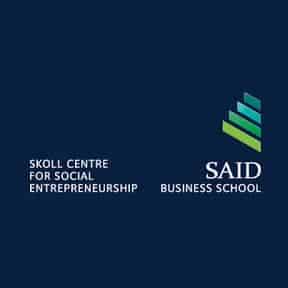Acumen and the Skoll Centre for Social Entrepreneurship Launch New Report on Unlikely Partnerships for Inclusive Business

- News
New York, NY – Acumen, the nonprofit global venture fund, and the Skoll Centre for Social Entrepreneurship at Oxford’s Saïd Business School, announced today the launch of a new report that reveals the creative ways that corporations and social enterprises are partnering to build inclusive and sustainable business models, and solve some of the world’s most pressing problems. Entitled ‘Beyond Dialogue: Building Sustainable and Inclusive Business Models in Partnership with Social Entrepreneurs’, the report features case studies of Levi Strauss, EY, Microsoft and others that highlight the opportunities and risks of these unusual collaborations with innovative social enterprises.
With support from EY, Levi Strauss Foundation, PepsiCo, Johnson & Johnson and Mars, Inc., Acumen and the Skoll Centre convened the leading practitioners of corporate/social enterprise (CSE) partnerships in April 2016 to delve into the potential for such partnerships to advance sustainable and inclusive business models. Today, a report that frames the four categories of CSE partnerships and provides case studies of six distinct collaborations has been published.
Since its founding in 2001, Acumen has invested $101 million to build nearly 100 innovative enterprises addressing the problems of poverty in Africa, South Asia and Latin America. Acumen’s approach includes not only provision of long-term private equity for early stage social enterprises, but also management support, technical assistance, insights into consumer preferences, and links to business opportunities and partnerships.
The Skoll Centre has been committed to the advancement of entrepreneurship driven by social impact as well, and as a pillar of the Saïd Business School and Oxford communities, has helped to launch research and events focused on the role of change agents and private sector leaders. Together, Acumen and the Skoll Centre are proud to have convened over 70 of the world’s leading innovators in CSE collaboration to learn from their experiences and challenge both corporations and social enterprises to achieve more together.
“The time is finally right for corporates to engage with social enterprises in partnerships that address each other’s core businesses” said Pamela Hartigan, the late Executive Director of the Skoll Centre for Social Entrepreneurship. Hartigan was an advocate for social entrepreneurship for the past several decades, who championed this joint effort.
According to Yasmina Zaidman, the Director of Strategic Partnerships at Acumen, “The Skoll Centre and Acumen share the belief that neither corporations nor social enterprises can achieve their full potential in an interconnected world without closer collaboration – but we all still have so much to learn about how to do this effectively.”
The Beyond Dialogue report provides a taxonomy of four major categories of partnership, and lays out detailed case studies that elucidate how these four approaches work.
A major driver of collaboration, according to the report, is the need for large companies to build both ethical conduct and reliability into their far-flung supply chains. According to Daniel Lee, Executive Director of the Levi Strauss Foundation, “we see tremendous potential for social enterprises to support our goals for improving the lives of apparel workers, and we’ve already seen what’s possible in Bangladesh. A stronger landscape of enterprises focused on the needs of low-income communities globally will create significant new opportunities for partnerships that are sustainable, impactful, and that engage with apparel workers to address their needs and aspirations.”
Skills partnerships developed by EY and channel partnerships developed by Levi’s are just two examples of the creative ways that corporations are engaging with social entrepreneurs to drive business and sustainability goals. At a time when businesses face pressure both to improve their social impact and remain competitive, the need to align impact goals with core business objectives is more important than ever. The examples in the report demonstrate the potential for partnerships to achieve both objectives, and is intended to encourage further development of CSE collaboration.
“To address public health issues in resource limited communities, we need new ideas and new business models to reach those in need. Engaging with social enterprises through events like this is giving Johnson & Johnson access to new perspectives that will shape how we partner, develop and deploy our products, services and innovations.” said Enrique Esteban, Johnson & Johnson Global Public Health, speaking of the April meeting that led to this report.
As businesses recognize this opportunity for collaboration, social enterprises that use business models to achieve social impact are looking to large corporations as partners on their path to scale and business viability. One increasingly popular approach is to link corporate capabilities with smaller businesses in need of support. “There is a disconnect between people with skills and purpose and enterprises on the ground needing those skills” said Jon Shepard, Director of EY Enterprise Growth Services, a not-for-profit unit which supports social enterprises in low and middle-income countries. The report documents EY’s efforts to help Jibu, a water enterprise that delivers safe and affordable drinking water to low income urban consumers in Africa, to scale their operation with support from an EY consultant.
Partnerships that make supply chains more inclusive are another focus of the report. “For our company, partnerships with food and agriculture businesses are key. Esoko’s model is to bridge between corporations and farmers to the benefit of both, and our corporate partners value that direct connection more and more as they seek more flows of information both to and from smallholder farmers.” Said Hillary Miller-Wise, CEO of Esoko, an Acumen portfolio company.
Among both social enterprises and large corporations, the value of collaboration is becoming clearer, along with an awareness of the risks. Beyond Dialogue explores where these partnerships are most effective and what results can be expected for those venturing into this new terrain of collaboration. It is available HERE.